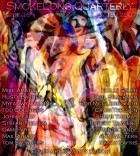When and how did “baby in a jar” come to you?
I wrote the story about 18 months ago. I began thinking about moments of transition, of how insignificant and lacking in drama they often appear. Also about choices, about how incidental or arbitrary they can seem at first and how emphatic they can become.
“The Fire Brigade teased Sneddon from the wreck like a cockle from a shell.” Love the choice of “teased” in this line. In flash, are such word choices especially important? And why “teased” here?
Yes, I think word selection is vital in flash. There’s so little time to make a point. Everything has to be refined, meaning has to be wrung from the smallest of details if the story is to be resonant and satisfying to the reader. The word teased suggests that Sneddon is tightly coiled within the wreck, foetal even, connecting with the image of the baby in the jar, a person not quite born. He’s a villain, but there’s also something quite innocent about him, his self-belief childlike, his personality not fully formed. “Jamjar” is cockney rhyming slang for car.
“Not knowing they were part of a moment, part of Sneddon’s story….” This line captures something beyond this story for me, something about all stories. Am I crazy to think so? And what’s this line mean to you?
To me, it means that we tend to be under the impression that our lives, our stories, are like building blocks stacked against and on top of one another, together but separate, whereas in reality they are intertwined. Sometimes in ways we’re aware of, sometimes in ways we’re not. Remember the innocent behind of the torturer’s horse in Auden’s Musée des Beaux Arts? How Icarus drowns unseen, part of the whole but unacknowledged.
“It’s almost as if they’ve crossed over from our world.” What do you make of this “crossing-over” in this story—and in our world?
The public and private worlds are very different, I think. Public lives are always in quotes somehow. With fame (or infamy in this case) the personality becomes bifurcated. There’s the real person and the person as perceived by society, owned by society you might even say. Once you’ve crossed over there doesn’t appeared to be a way back – not even in failure. I’m surprised by how many people want fame of this sort.
At the recent AWP conference, a number of writers talked about their old flames, books that have influenced them during a formative time in their lives —and ones they return to for lessons in writing and, of course, life. Discuss your old flame, both what it meant to you then and what it means to you now.
The Catcher in the Rye, On the Road, Catch-22, Slaughterhouse Five, all of these were important to me when I was young and not a writer. They formed my world view, something that hasn’t changed over the years. Later, aged 35, when I began to study for an English degree and out of that began to write, The Trial, Great Expectations, The Great Gatsby and Chekhov’s short stories joined the picture. All of these books and many others taught me everything I know about writing, also, more importantly, everything I don’t know and should know about writing. I’m mystified by people who don’t read and who want to write. Being a good reader is the essence of being a good writer. You have to fill your ears with the sound of good writing, learn its rhythms and cadences, be moved and informed by it. Books on how to write are next to useless. Great writing is about invention, about ideas, about freshness, every great story or novel creates its own rule book, evolves its own techniques. It might involve the coolness and distance of the passive voice, the historical, societal or temporal scope of the told rather than the shown, anything that serves its purpose and affords it a valuable perspective and tone.



 The core workshop of SmokeLong Fitness is all in writing, so you can take part from anywhere at anytime. We are excited about creating a supportive, consistent and structured environment for flash writers to work on their craft in a community. We are thrilled and proud to say that our workshop participants have won, placed, or been listed in every major flash competition. Community works.
The core workshop of SmokeLong Fitness is all in writing, so you can take part from anywhere at anytime. We are excited about creating a supportive, consistent and structured environment for flash writers to work on their craft in a community. We are thrilled and proud to say that our workshop participants have won, placed, or been listed in every major flash competition. Community works.